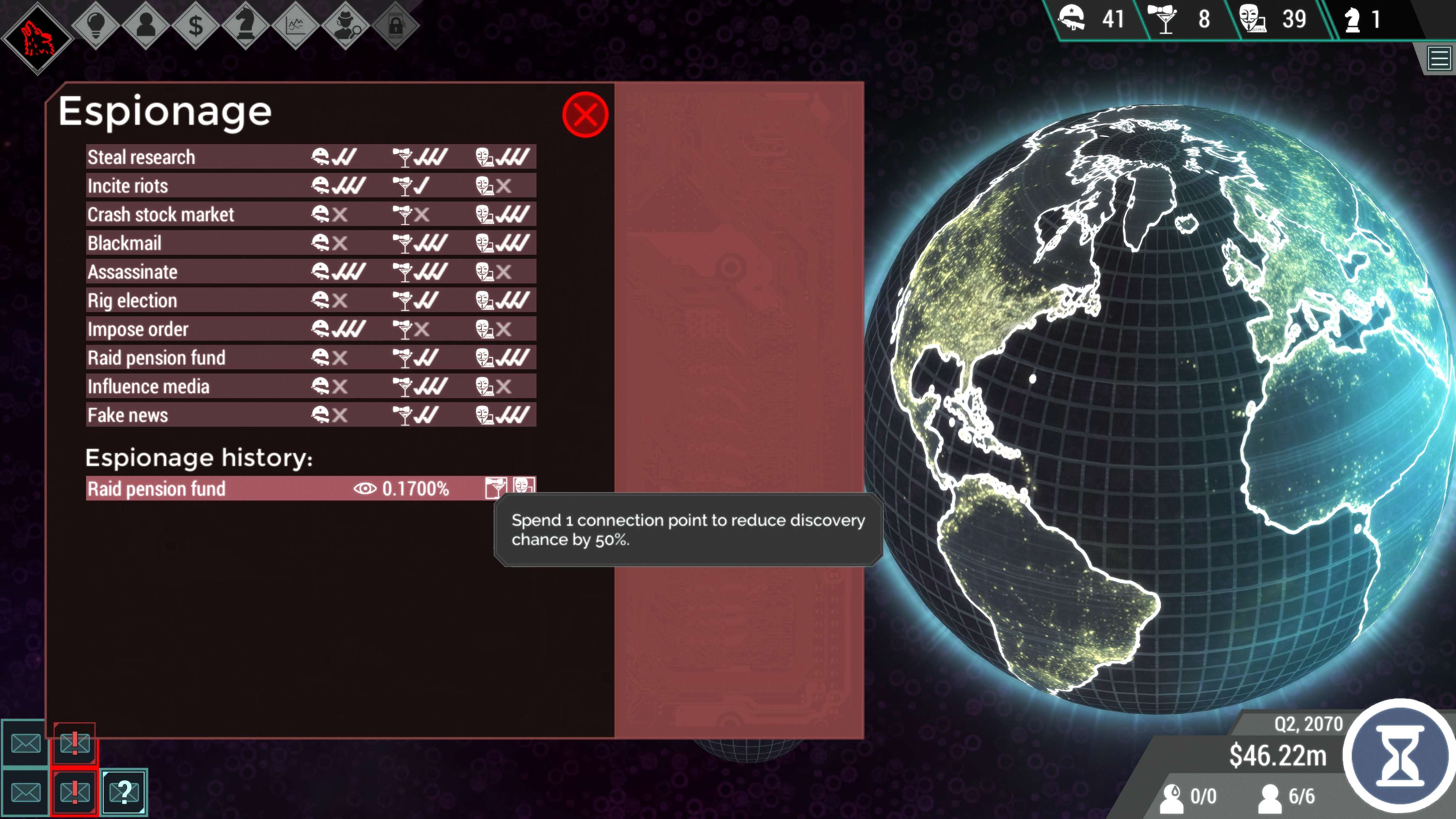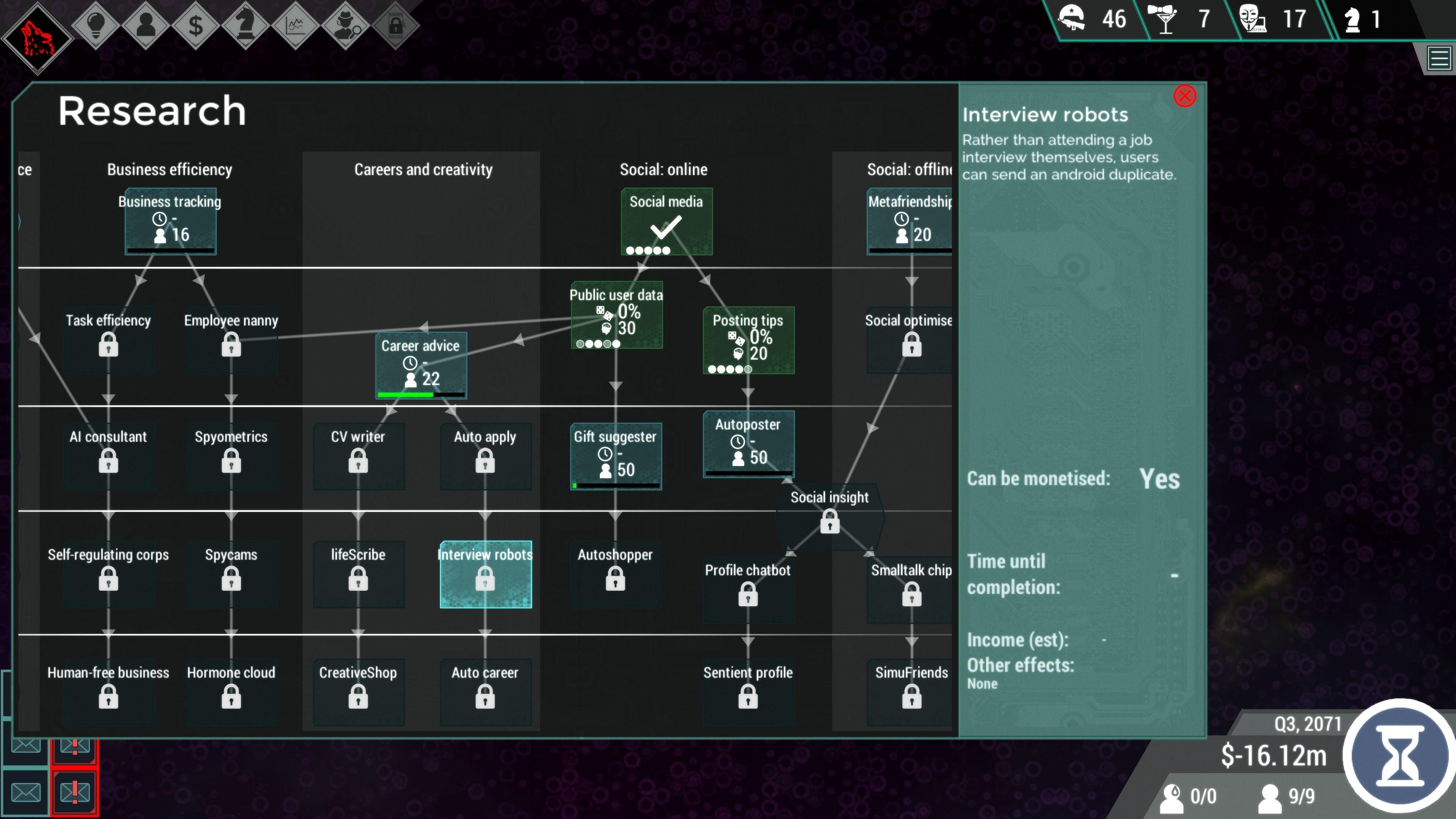Run your own evil megacorporation in Spinnortality, a dystopian strategy game
Being bad feels pretty good.

I’ve just launched a social media network in Europe that, based on your personality and posting habits, buys things before you even know you need or want them. But it’s a disaster. The angle is all wrong, the market hates it, and I’ve lost millions. But while this may have ruined a lesser company, the PC Gamer evil megacorporation has a plan to dig itself out of this hole. I decide to siphon cash from my pension fund, yielding up to $20 million for each worker I currently have employed. There’s a chance I’ll get caught, ruining my reputation, but it’s worth it. A few turns later and my bank is full of dirty money.
Spinnortality is a game about managing the kind of evil corporation that’s usually the antagonist in a cyberpunk story. Those monolithic, faceless multinationals that guys like Adam Jensen risk their lives to expose. It’s a delicious premise and executed well—especially when you consider that the game is being made by just one person. Developer James Patton describes his ambitious new project as “a cyberpunk strategy/management game where you run a giant, insidious megacorporation.” And explains that, to make your dubious business a success, you’ll have to spin products, influence the media, manipulate politicians, become immortal, and ultimately take over the world.
But rising to the top won’t be easy. Each turn represents 3 months (or one fiscal quarter), and it’s possible to die of old age unless you research and develop the ability to transfer your consciousness into another body. But even when you’ve dealt with the inconvenience of mortality, there are a dozen other things to cause you problems. Corporate espionage, corruption, inefficiency, low public opinion. So as well as developing new technology and trying to make a profit, you have to deal with all these factors as well. It’s like spinning plates, and has given me a newfound respect for all those sinister cyberpunk corporations. A lot of work goes into being evil, and I can only imagine the headaches Deus Ex villain Bob Page had getting VersaLife off the ground.

After each turn you have to make a decision. North Africa might ask you for financial aid to help with a viral outbreak, which will boost public opinion and lose you a lot of money. But refusing them could give you a bad reputation and increase the chance of the virus spreading to other nations. Or perhaps the media has caught wind of how unhappy your employees are. Ignoring the bad press will damage public opinion, but you can always make it go away by giving your workforce a costly bonus. Juggling the positives and negatives of these decisions adds yet another layer of strategy to running your empire. And sometimes deciding what to do is genuinely difficult, especially when your employees hate you and your finances are dangerously in the red.
Developing and launching products is the key to fiscal stability, but you have to know your market. If you try and launch an invasive social media network in a nation that cherishes privacy, it’s probably gonna bomb. But launch the same network in a country that leans more towards publicity and you’ll make a tidy profit. Other dystopian products you can develop include a hormone cloud used to control workers, a sentient social media profile that posts for you, and retina-implanted cameras to make sure employees aren’t slacking off. Development requires money, time, and staff, but making a big investment, while costly in the short term, will earn you a lot more money later.

But here’s the really cool part. If your brand has a strong enough presence in a particular nation, you’ll be able to influence its culture to better suit your products. So a xenophobic nation could become multicultural, or a spiritual nation may suddenly become obsessed with material wealth. Manipulating the world and pulling the strings from the shadows makes you feel like a Bond villain. It’s weirdly intoxicating, and I love how being evil is intrinsically linked to the game’s systems. The more underhanded, manipulative, and corrupt your corporation is, the more money, power, and influence it’ll have. Which makes me wonder if this game is set in the future at all.
If raiding pension funds isn’t your thing, there are other ways to break the law for fun and profit. You can steal research from rival companies, speeding up the development of your own products. You can incite riots to destabilise nations or blackmail their politicians in exchange for influence. Or maybe you just want to indulge in a bit of good old fashioned election rigging, ensuring a certain politician wins. Again, is this a dystopian game or a contemporary simulation? But with every illegal action you take, the risk of being caught increases. The challenge is maintaining the illusion of being a legitimate company while covertly crashing stock markets and assassinating politicians.
Keep up to date with the most important stories and the best deals, as picked by the PC Gamer team.
There’s a lot more to Spinnortality, but I’ll let you discover the rest yourself when the game is released on August 31. It’s a remarkably deep simulation, with more layers of strategy emerging as your company grows. I’m looking forward to playing the finished thing, but for now I need to find a good use for all that pension money I stole for the PC Gamer corporation. Maybe I’ll spread some fake news to gain media influence, or research an advanced AI to replace my fleshy, fragile human workforce. The possibilities for evil are endless, and it’s nice to be playing the as the bad guy in a cyberpunk game for once.

If it’s set in space, Andy will probably write about it. He loves sci-fi, adventure games, taking screenshots, Twin Peaks, weird sims, Alien: Isolation, and anything with a good story.


